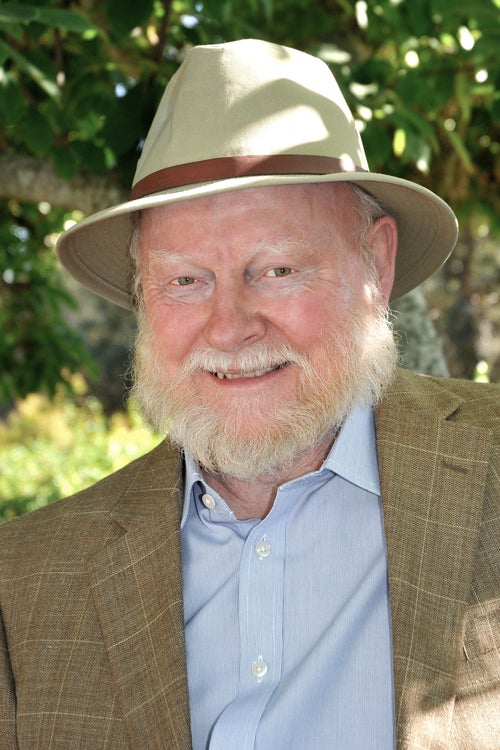|
October 2, 2014
Stanford economics Professor Emeritus Ronald McKinnon dies at 79
A leading thinker in the field of international economics, Ronald McKinnon was one of the first academics to analyze "financial repression" as a substantial barrier to successful economic development. One colleague described him as an "intellectual giant" throughout the Stanford community and beyond. By Clifton B. Parker

Ronald McKinnon (Photo: Sunny Scott)
Ronald I. McKinnon, the William D. Eberle Professor in Economics, Emeritus, died Oct. 1 at the Mills-Peninsula Hospital in Burlingame, California, from complications resulting from a fall on an escalator at San Francisco International Airport on Sept. 18. He was 79.
McKinnon was born in Edmonton, Canada, on July 10, 1935. He joined the Stanford economics faculty in 1961 as an assistant professor. He received tenure in 1966, was promoted to full professor in 1969 and eventually became a chaired professor. He earned his bachelor's degree in economics from the University of Alberta in 1956 and his doctorate in economics from the University of Minnesota in 1961.
McKinnon was an applied economist whose primary interests were international economics and economic development. Understanding financial institutions and monetary institutions was central to his teaching and research. A prolific writer, he wrote or co-authored nine books and penned numerous articles and commentary pieces for economic journals and publications such as The Economist, the Financial Times and the Wall Street Journal.
'Intellectual giant'
"SIEPR and the entire Stanford economics community lost a dear friend and an intellectual giant. We were lucky to have shared him for 53 years," said John Shoven, the director of the Stanford Institute for Economic Policy Research.
Shoven said McKinnon combined wit and wisdom. "He was both an intellectual powerhouse and a fun-loving colleague with a twinkle in his eye while he told a joke or two, or argued for his favorite unconventional theory."
McKinnon's wife, Margaret, said that her husband had a "second wind" of academic inquisitiveness that made his retirement years very active. "He did a lot of work on Asia and China, and was engaged with a whole new generation of economists and organizations."
She added that McKinnon loved economics. "He was a family man, but if something came up in economics, we knew where he would turn. His granddaughters remember him for his devotion to them and for his infectious passion for his work."
Financial repression
Along with his Stanford colleague the late Edward S. Shaw, McKinnon was among the first scholars to investigate "financial repression" as a substantial barrier to successful economic development. Financial repression refers to policies that force savers to accept returns below the rate of inflation and that enable banks to provide cheap loans to companies and governments to reduce the burden of their debt repayments.
His first book, published in 1973, Money and Capital in Economic Development, analyzed why the prevailing economic doctrines of the time had become too tolerant of inflation and of state interventions in the credit mechanism. McKinnon noted that without proper constraints, politicians were only too tempted to direct the flow of credit to suit their own ends.
He suggested strategies to escape financial repression in his 1993 book, The Order of Economic Liberalization: Financial Control in the Transition to a Market Economy. In it, he outlined how to liberalize government policies in domestic finance and foreign trade as a way to create more open markets.
McKinnon's other major area of interest was the study of international money and finance. He probed how the use of national currencies allows international trade to be effectively monetized and multilateral rather than bartered and bilateral.
Those rules of the game, McKinnon noted, can only be understood by considering the historical perspective – from the late 19th-century gold standard, the Bretton Woods Agreement of 1945 and the postwar dollar standard.
In Money in International Exchange: The Convertible Currency System (1979), McKinnon analyzed why and how the dollar came to be used as an international vehicle and reserve currency among banks and the primary currency of invoice in international commodity trade.
In his 1996 book, The Rules of the Game: International Money and Exchange Rates, McKinnon discoursed on macroeconomics and how the dollar standard could have been modified to make the world economy more stable in the postwar era.
East Asia, China and students
In his later years, McKinnon focused on East Asia and the great currency crisis of 1997-98 in that region, as well as Japan's liquidity trap. With Kenichi Ohno, McKinnon wrote Dollar and Yen: Resolving Economic Conflict between the United States and Japan (1997).
"His work had a following all over the world," said Shoven. "This was brought home to me in 1979 when I was visiting the London School of Economics and Ron McKinnon came to give a seminar. The faculty and students were so anxious to hear Ron that the seminar room was standing room only."
McKinnon was deeply engaged with his students – both graduate and undergraduate – many of who went on to write doctoral dissertations or senior undergraduate honors theses under his mentorship.
Throughout his career, McKinnon traveled internationally to conferences and for consulting with central banks and monetary authorities in Asia, Latin America, North America and Europe. He worked with international agencies such as the International Monetary Fund, the World Bank and the Asian Development Bank, among others.
He is survived by his wife, Margaret Learmonth McKinnon, and three children – Neil Charles McKinnon of San Francisco; Mary Elizabeth McKinnon Villeneuve of Redlands, California; and David Bruce McKinnon, of Ottawa, Canada; and seven grandchildren. Plans for a memorial service have not yet been announced.
-30-
|